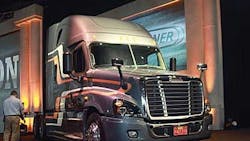Freightliner Trucks unveils the Cascadia Evolution powered by Detroit
OVER dinner on May 29 with members of the trucking press, Daimler Trucks North America's Martin Daum suggested that a 10-mile-per-gallon Class 8 tractor was well within reach. It turned out this was no idle speculation for DTNA's chief executive officer.
The next morning, the truck builder unveiled its new 2014 Cascadia Evolution, which reportedly achieved better than 10mpg in a recent test. Specifically, the Evolution — powered by a newly designed Detroit DD15 engine and featuring enhanced aerodynamic specs — delivered an impressive 10.67 mpg on a test track.
The optimally spec'd Cascadia Evolutionwas tested at the Continental Proving Grounds in Uvalde, Texas. There, the truck traveled the 8.5 mile closed-course track for 1,000 miles nonstop at an average speed of 60 miles per hour, with a gross combination weight of 76,000 pounds, which ismore typical of freight haulers. Freightliner officials say tank truck carriers running 80,000 pounds are unlikely to reach or exceed the 10-mpg mark. Fuel consumption and distance traveled were measured at the end of the demonstration by Automotive Testing and Development Services (ATDS), an independent, third-party auditor using high-accuracy fuel flow meters.
That was followed by the Evolution of Efficiency cross-country tour, which ran 2,400 miles from San Diego, California, to Gastonia, North Carolina. The Cascadia Evolution achieved 9.31 miles per gallon even while encountering significant cross-winds during the trip. Again, the gross combination weight was 76,000 pounds.
A significant number of test units are already in service with fleets. Freightliner Trucks will start production on the Cascadia Evolution in 2013.
New engine
Powered by a Detroit engine and featuring some of the most advanced aerodynamic enhancements in the industry, the Cascadia Evolution delivers up to an additional 7% improvement in fuel economy over an EPA 2010-compliant Cascadia equipped with a first generation aerodynamic package and up to a 5% improvement compared to a current model year 2013 Cascadia equipped with the latest aerodynamic upgrades.
“With the introduction of the Cascadia and Detroit DD15 in 2007, our priority was to help customers lower their total cost of ownership through improved fuel efficiency and performance,” said David Hames, general manager, marketing and strategy for DTNA. “The Cascadia and the DD15 have since made a powerful impression on businesses.
“Now, with the Cascadia Evolution, we are building upon our commitment to maximizing our customers' bottom lines with new product advancements that will deliver unprecedented fuel efficiency.”
The optimized aerodynamic features on the new Cascadia Evolution were developed using DTNA's wind tunnel — the only full-scale, OEM owned and operated wind tunnel for big rigs in North America. In addition, the truck was extensively tested on highways throughout the United States, and underwent almost three million miles in combined reliability and fuel economy testing.
With new, standard features that seamlessly combine the Cascadia's already sleek profile with enhanced aerodynamics, the Evolution incorporates several frontal area updates designed to improve airflow and aerodynamics including a new air dam, bumper closure and a hood-to-bumper fill.
The Evolution also includes an improved windshield seal, elliptical-shaped aerodynamic mirrors and an integrated antenna. New wheel covers on the rear tandem axles, chassis side fairings and 20-inch side extenders further contribute to the truck's efficiency. Cooling enhancements include a 1,400 square-inch radiator, which features a revised baffling system and new radiator mounting design that contribute to improved cooling capacity and increased durability.
Cruise control
Also standard with the Evolution is Freightliner's proprietary Run Smart Predictive Cruise system. This innovative technology evaluates the road profile more than one mile in advance, determines the most efficient vehicle speed, and then adjusts the actual speed of the truck for maximum fuel efficiency.
“We examined every detail to ensure that no stone was left unturned when developing the Cascadia Evolution,” said TJ Reed, director of product marketing for Freightliner Trucks. “The result is a truck that will immediately benefit fuel economy performance and overall cost of ownership.”
Next generation
Available only in the Evolution, the newly designed DD15 engine features a proprietary asymmetric turbocharger with a next-generation amplified common rail system (ACRS). The asymmetric turbocharger is less complex than variable geometry turbos and, because it is proprietary, is optimally matched to the DD15's EGR system for best real world fuel consumption, resulting in excellent performance. The next-generation ACRS also delivers higher injection pressure for better combustion control and a simplified design for optimal regenerations.
The enhanced DD15 is more than 100 pounds lighter than its predecessor and includes an improved fuel filter module with two filters that lower maintenance costs with a 100,000 mile filter change interval. The engine also features a variable speed water pump that allows for lower impeller speeds, resulting in less parasitic load, improved DDEC electronics for better engine and aftertreatment system management, and an optimized piston design for less friction and oil consumption.
Further adding to the overall performance of the Evolution, the DD15's BlueTec emissions technology 1-Box package has been optimized to decrease size, weight and complexity.
“Detroit is once again challenging the norm by exceeding expectations and optimizing performance,” said Brad Williamson, manager, engine and component marketing, DTNA. “We're changing the way the industry looks at diesel engines.”
The Detroit Virtual Technician system — standard on the Cascadia Evolution — helps reduce downtime and decrease maintenance costs by providing real-time engine diagnostics, enabling drivers and fleet managers to quickly and accurately evaluate events, and in many cases allowing them to remain driving when others would have to stop to evaluate the event. It also minimizes time in the shop by almost eliminating the diagnostic time since it is completed when the truck arrives by the Detroit customer support center.
The Cascadia Evolution is Freightliner's most recent addition to its line-up of fully compliant GHG14 vehicles. In February 2012, the Environmental Protection Agency (EPA) certified DTNA's complete portfolio of model year 2013 on-highway, vocational and
medium-duty vehicles as fully compliant with the new GHG14
regulations. ♦

